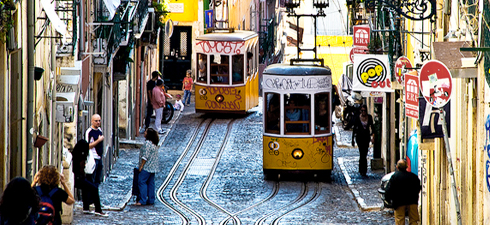Whatever the implications of the bailout from the international bodies, the country – in other words, each and every one of us – will have to rethink how we live. As in Greece and Ireland, the Portuguese will no longer enjoy a lifestyle that will come up to European ‘standards’. Yes indeed, our survival is at stake. We’re being turfed from the “rich man’s club”, and so obviously we’ll have to stop carrying on like Europeans. We'll just have to brush down our trousers and brace ourselves to join the Third World.
Our current predicament is, fundamentally, of our own making. But Europe has also failed in its duty to show solidarity towards the weakest and has let us down. The Union has imposed ever more stringent rules, and often we have bent them. Some of the rules, which are fine for the rich, are not so easy to stick to when you’re poor, from the rules for grading simple fruit to those governing the simple logistics needed to run a restaurant smoothly.
The time is coming when a family will have to peddle hot dogs on stairways; when the handyman with a little talent will earn his living by installing switches; when producers sell their home brews and hams smoked in the back yard without any certification; when the mechanic on the street corner will build and install an exhaust pipe with his own hands; when we will have to resign ourselves to driving on poorly maintained highways through areas deprived of service stations, lacking reflectors along the centre line – or no centre line at all – but on highways without toll gates.
Let’s shake off this dependence on the state
Are we really going to regress to that? Will poverty make us a country less safe, less certified, less European?... Perhaps we need to rethink the Food Safety and Economic Authority (ASAE), the periodical technical inspections of vehicles, carpeted play areas for children. Perhaps what lies in wait for us is a country where everyone is free to make a living in his own way: selling live animals at market, driving passengers around in rattling old vans, peddling eggs straight from the backyard henhouse, all without any of those complicated strictures imposed by Brussels. We will die more easily, have more accidents and less help. Bad luck. And we will find out very quickly if we can still wriggle out of a tight spot with our talent for desenrascanço [coming up with a clever fix], without having to bow down like the Europeans.
But there’s another way out: through hard work. Let’s shake off this dependence on the state. Let’s stop blaming the government for all our ills. Let’s work out for ourselves our own strengths: wine, olive oil, tourism, advanced technology, the sea, cork trees, footwear, renewable energy – and once and for all export them without waiting for incentives. Let’s allow a government with some courage to reform the justice system and stop the abuse of social benefits. Let’s ensure that the “penniless generation" creates jobs instead of just waiting around for them. About ten years of this and we will get back into the Europe club. But by then we will have paid our own way, and no one will have granted the membership, not even a Jacques Delors.
From America
Markets a threat to democracy
“Portugal’s plea for help with its debts from the International Monetary Fund and the European Union last week should be a warning to democracies everywhere,” writes American sociologistRobert M. Fishmanin the New York Times. According to him, unlike Greece and Ireland, where “the verdict of the markets reflected deep and easily identifiable economic problems,” Portugal was not doing that badly just a few months ago. “There was not a genuine underlying crisis”. The country “had strong economic performance in the 1990s and was managing its recovery from the global recession better than several other countries in Europe,” Fishman writes. “But it has come under unfair and arbitrary pressure from bond traders, speculators and credit rating analysts who, for short-sighted or ideological reasons, have now managed to drive out one democratically elected administration and potentially tie the hands of the next one.”
“If left unregulated, these market forces threaten to eclipse the capacity of democratic governments...to make their own choices about taxes and spending,” Fishman warns. That is why, he adds, “In Portugal’s fate there lies a clear warning for other countries[...] It is quite possible that 2011 will mark the start of a wave of encroachment on democracy by unregulated markets, with Spain, Italy or Belgium as the next potential victims.” “Only elected governments and their leaders can ensure that this crisis does not end up undermining democratic processes. So far they seem to have left everything up to the vagaries of bond markets and rating agencies.”
Was this article useful? If so we are delighted!
It is freely available because we believe that the right to free and independent information is essential for democracy. But this right is not guaranteed forever, and independence comes at a cost. We need your support in order to continue publishing independent, multilingual news for all Europeans.
Discover our subscription offers and their exclusive benefits and become a member of our community now!












